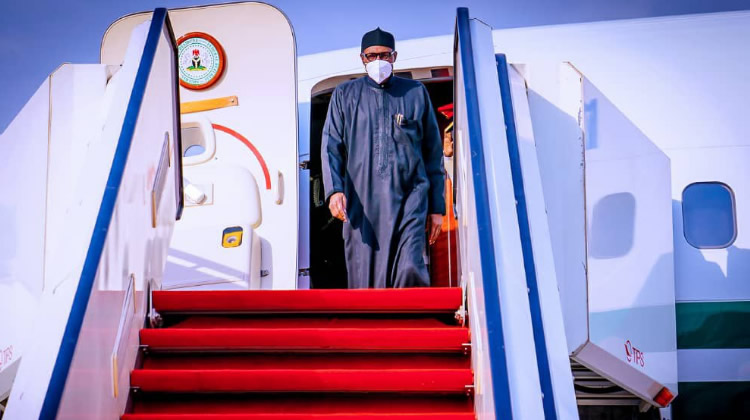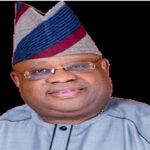
The President, Major General Muhammadu Buhari (retd.), on Sunday morning, returned from Washington DC, United States, after a week-long engagement at the US-Africa Leaders Summit.
Buhari’s official jet landed at the presidential wing of the Nnamdi Azikiwe International Airport, Abuja, in the early hours of Sunday, bringing the total number of foreign trips made in 2022 to at least 19.
The countries so far visited include Rwanda (June), Equatorial Guinea (May), Guinea Bissau (December), Niger (December), the United States (September and December), the United Kingdom (March and November), the United Arab Emirates (May), Liberia (July), South Korea (October), Ghana (June), Portugal (June), Spain (May), Belgium (February), Ethiopia (February), Kenya (March), Ivory Coast (May) and Senegal (July).
In-between, the President and his Vice have both been away from the country at the same time at least thrice in the last two months, The PUNCH observed.
In his first address at the US-Africa Leaders Summit, the Nigerian President reaffirmed the Federal Government’s commitment to generating 30 gigawatts of energy by 2030.
Buhari noted that Nigeria became the first African country to develop a detailed Energy Transition Plan to tackle both energy poverty and climate change.
Consequently, he sought the United States’ support to achieve Nigeria’s Energy Transition Plan which, he said, requires at least N10bn/year to finance.
During the discussion panel on Just Energy Transition, Buhari cited a recent analysis which showed that delivering the Energy Transition Plan requires $1.9tn spending up to 2060, including $410bn above business-as-usual spending.
This additional financing requirement, he explained, translates to a $10bn investment needed per annum.
In his second address, the President warned his fellow African leaders that unconstitutional regime change, terrorism and the effects of climate change on the continent may undermine the ability of her states to achieve the Agenda 2063.
Speaking on the topic, Partnering on Agenda 2063: A Peaceful and Secure Africa, Buhari however expressed hope that these threats will not trump the unity of purpose shares amongst all member states.
He urged member states to quell the resurgence of conflicts in their regions through inclusive governance, constitutionalism and the strengthening of African Union mediation support and conflict prevention mechanisms.
At an interactive session on Friday titled A conversation with President Muhammadu Buhari of Nigeria, the President said he has given the Independent National Electoral Commission the required resources for a smooth conduct of the 2023 elections.
Therefore, he will entertain no excuses from the political umpire on the basis of funds shortage.
“I made sure they were given all the resources they asked because I don’t want any excuses that they were denied funds by the government,” Buhari said in response to a question on INEC’s readiness for the 2023 elections at the event co-hosted by the United State Institute of Peace, the International Republican Institute, the National Endowment for Democracy, and the International Foundation for Electoral Systems.
Buhari also cautioned western nations on the “frivolous” issuance of travel advisories on Nigeria, urging the international media to be more objective in its reportage of the country.
On the bilateral scene, Nigeria signed two agreements on space exploration and clean energy.
On the first day of the summit, Nigeria, alongside Rwanda, became the first African nations to sign the Artemis Accords.
According to a statement released by the United States Department of State, “The accords were signed by Minister of Communications and Digital Economy Prof. Isa Pantami on behalf of the Federal Republic of Nigeria and by Rwanda Space Agency CEO Francis Ngabo on behalf of the Republic of Rwanda.”
The Artemis Accords represent a bold, multilateral vision for the future of space exploration. The current 23 signatories commit to principles to guide their civil space activities, including the public release of scientific data, responsible debris mitigation, registration of space objects, and the establishment and implementation of interoperability standards.
On the second day, the Nigerian Ministry of Industry, Trade and Investment signed an agreement on clean and reliable energy with Sun Africa LLC, the largest US renewable energy company operating in Africa.
The agreement earmarked at least 360 rural communities and 16 others nationwide for the construction of 5,000MW of solar power generation and 2,500MWh of battery energy storage power plants.
The first phase of the project scheduled for the first quarter of 2023 include: Gwagwalada, FCT (143 MWp PV size and energy storage of 68MWh); Gombe, Gombe State (270 MWp PV size and energy storage of 128MWh); Lafia, Nasarawa State (350 MWp PV size and energy storage of 166MWh); Geregu, Kogi State (174 MWp PV size and energy storage of 82MWh) and Ihovbor, Edo State (24 MWp PV size and energy storage of 11MWh).
The President returns amidst disputed between state Governors, lawmakers and the Central Bank of Nigeria over the N20,000 daily cash withdrawal limits imposed by the latter.





